DUBAI: Education, like charity, begins at home.
The adage couldn’t be truer for Omar Farooqui, a 42-year-old investment banker turned educator, who says he was taught a lesson at home by his 12-year-old son.
He says he turned the tables on his lucrative career and moved to education when he realized how unhappy his son was with the traditional system of schooling and the current present education system which was archaic and irrelevant for the children of today.
It was at that moment that he decided to adopt technological tools to inject some fresh blood into the educational sector. To realize his goals, Farooqui, who is based in Dubai, set up Coded Minds – an educational company that finds its roots in technology-based solutions.
As the founder and chief innovation officer of Coded Minds, he says he began his [global journey] with Pakistan to introduce new teaching methods from the grassroots to the university levels. For the purpose, he is in talks with several leading universities, school representatives, and government authorities to collaborate on several projects in Pakistan.
Speaking to Arab News, Farooqui said that the education system in Pakistan needed a total revamp. “Education in Pakistan is an extremely fragmented sector and one that needs a lot of re-organization. It is very much set in the old British colonial style which in itself is outdated. If you add to that a fragmented mix of American as well as Pakistan’s very own educational standards then you really do have a sector that needs to be re-organized from top to bottom,” Farooqui, a Saudi national said. He added that Pakistan holds a very special place in his heart because of his father who was originally from Pakistan. Azad Kashmir’s Muzaffarabad’s area and mother from Lahore.
Adding that the issue is not specific to Pakistan, but one that impacts the rest of the world too, Farooqui says the traditional education system is outdated globally. “It does not prepare the child for the real world. An over-reliance on theories and yearly examination leads to a system that gears itself only for college or university admissions and not for the actual, every day, practical life,” he said.
Farooqui believes that a technology-based system can help Pakistan attain new age education standards. “In fact, technology encourages cross schools collaborations, too,” he said.
Dr. Jawaid Laghari, former chairperson of the Higher Education Commission (HEC) concurs. Endorsing the fact that technology can play a major role in improving the quality of education and limiting the number of public school dropouts, he said: “Online free access through low-cost bandwidth and low -cost tablets would make a difference. Singapore is a model to emulate.”
Dr. Laghari added that the present public education system — both at the school and college levels — is unsatisfactory. “It is subject to bad management and corruption. We need to give at least one year to the present government if the reforms they would introduce will make a change,” he said.
According to Pakistan’s educational statistics from 2015 to 2016, 21 percent of primary schools in the country is being run by a single teacher while 14 percent have a single room. Additionally, in terms of the schools’ infrastructure, 40 percent of primary schools in the public sector operate without electricity, 28 percent do not have toilets, 25 percent are without boundary walls, while 29 percent have no access to drinking water. Seven percent of schools do not have any building and 43 percent have dilapidated buildings.
Farooqui is aware of these numbers. As he is of the fact that the low literacy rate has always remained a constant in Pakistan – a country which has barely witnessed an improvement or enhanced enrollment in the past couple of years. According to the Economic Survey of 2017-18, “last year, the literacy rate dropped by two percent from 60 to 58 percent. This year it has remained the same with no improvement”.
Farooqui believes that children opt to drop out of school either when the quality of education is unaffordable or of very poor quality. “Technology plays a heavy role in bridging the gap. In fact, it will not only help improve teaching standards but will improve individualized learning too, be it public or the private schools.
Aware of the hurdles that he might have to face along the way, Farooqui says he is all set for the battle.
“Change is the one thing that most human beings are afraid to do. We intend to partner up with local institutions and at the same time gather governmental support so we can take a top-down approach,” he said, adding that even though the education values in Pakistan are different from those of Saudi Arabia and the UAE, the basics are the same.
“It is the culture and traditions that make the difference. Majority of the battle that we face is about creating awareness as well as bringing change,” he said.
He added that the one-of-its-kind private collaboration with Saudi, in Pakistan’s education sector, will go a long way. “Saudi Arabia and Pakistan have always enjoyed long cordial brotherly relations and that will never change due to the strategic nature of both countries,” said Jeddah born educator.
“Saudi Arabia has always had private capital investment into Pakistan through partnerships and now more recently Saudi Arabia has committed to deploying capital as part of the CPEC. I am certainly hoping that through Coded Minds initiative, there will also now be a major inflow of capital into the education system of Pakistan not just through Saudi Arabia but even beyond that.”
“Change is the one thing that most human beings are afraid of”
“Change is the one thing that most human beings are afraid of”
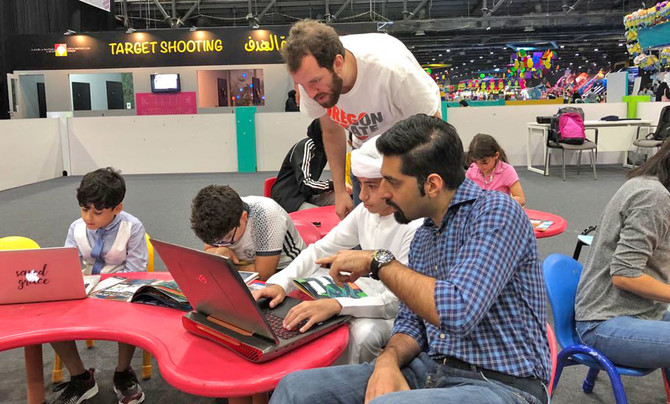
- A Saudi national educator is asking people to fight their fears by encouraging an overhaul in Pakistan’s educational system
- Insists that the existent teaching methods are archaic and do not prepare a child for the real world
New Zealand outclass Pakistan to win 4th T20I

- Opener Tim Robinson hit a half-century to ensure New Zealand reached 178-7 in 20 overs
- Pacer William O’ Rourke returned figures of 3-27 to keep Pakistan down to 174-8 in 20 overs
LAHORE: Experienced allrounder Jimmy Neesham kept his cool to defend six off the last ball to clinch a four-run victory for New Zealand on Thursday in the fourth Twenty20 international against Pakistan in Lahore.
Pakistan needed 18 off the last over in their chase of 179 but Neesham came out in flying colors despite being hit for a boundary off the first ball, giving a packed Qaddafi Stadium crowd heartbreaks.
Opener Tim Robinson hit a maiden half century to lift New Zealand to 178-7 in 20 overs before pacer William O’Rourke claimed 3-27 to keep Pakistan down to 174-8.
Returning allrounder Imad Wasim (22 not out) managed to hit the last ball for a single as New Zealand take an unassailable 2-1 lead in the five-match series with the last game on Saturday, also in Lahore.
Pakistan also lost the third match by seven wickets after winning the first by the same margin while the first match was abandoned after just two balls — all three in Rawalpindi.
The defeats are a jolt to a full-strength Pakistan side in their preparations for the Twenty20 World Cup to be held in the United States and the West Indies in June.
New Zealand, missing a host of players due to Indian Premier League, injuries and unavailability, can feel elated at their bench strength going into the World Cup.
Pakistan sensed they were in with a chance when Fakhar Zaman, who made 45-ball 61 with three sixes and four boundaries, lifted Pakistan from 79-4 with a 59-run stand for the fifth wicket with Iftikhar Ahmed who made a 20-ball 23.
But O’Rourke, playing only his fourth T20I, dismissed Ahmed to add to his wickets of Babar Azam (five) and Saim Ayub (20) to give New Zealand a boost.
Fellow pacer Ben Sears (2-27) claimed Zaman’s wicket with 33 needed off 14 balls.
Earlier, Robinson batted with aggression.
Robinson’s 36-ball 51 with two sixes and four fours lifted New Zealand — who were sent in to bat — to 93-1 in 10 overs before Abbas Afridi’s career best 3-20 helped Pakistan pull back.
New Zealand started briskly with Robinson and Tom Blundell, who made 28 off 15, putting on 56 for the opening stand in five overs.
But from 94-1 New Zealand lost three wickets, including that of dangerman Mark Chapman for eight, as Pakistan’s fielders held catches to back some good bowling by Abbas.
Dean Foxcroft chipped in with 34 off 26 deliveries and skipper Michael Bracewell added 27 to keep the scoreboard ticking as New Zealand managed 43 in the last five overs.
Pakistan were forced to make five changes as wicketkeeper-batter Mohammad Rizwan and Muhammad Irfan Khan were injured while they rested Shaheen Shah Afridi, Naseem Shah and Abrar Ahmed.
Pakistani, US officials discuss ways to enhance bilateral trade and investment
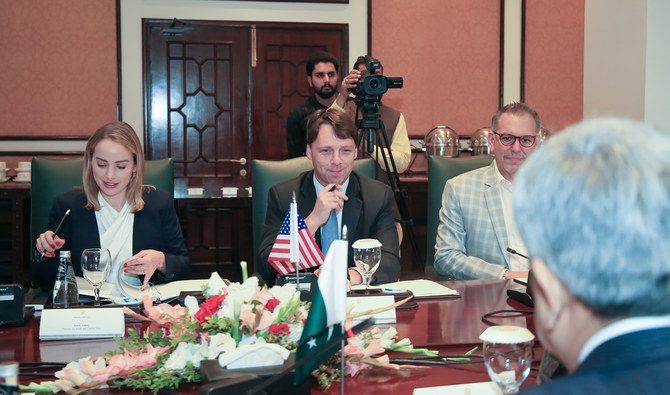
- Pakistani, American officials hold inter-sessional meeting under Trade and Investment Framework Agreement
- Both sides discussed regulatory practices, digital trade, textiles and investments, says US Embassy in Pakistan
KARACHI: Pakistani and American officials held an inter-sessional meeting under the Trade and Investment Framework Agreement (TIFA) on Thursday, with both sides discussing options to enhance bilateral trade and investment, the US Embassy in Islamabad said in a statement.
TIFA serves as a platform for Pakistan and the US to improve market access, promote bilateral trade and investment, resolve trade disputes, and work on trade-related issues between the two countries.
Pakistan and the US took part in high-level trade talks in Feb. 2023 when both countries participated in the 9th Pakistan-United States Trade and Investment Framework Agreement (TIFA) Council meeting. That meeting took place after seven years.
As per a statement by Acting US Mission Spokesperson Thomas Montgomery, both sides discussed a “broad range of areas” to enhance bilateral trade and investment on Thursday.
“The dialogue focused on good regulatory practices, digital trade, the protection of intellectual property, women’s economic empowerment, labor, textiles, investment, and agricultural issues,” Montgomery said.
He added the discussions also included progress on access for US biotechnology products and beef.
The US official said that the meeting was key for both countries to move forward on shared goals of deepening their economic relationship.
“The United States has long been Pakistan’s largest export market, with potential for further growth,” he said, adding that the US has been a leading investor in Pakistan for the past 20 years.
Pakistan’s relationship with Washington has experienced fluctuations over the decades, characterized by periods of close partnership and notable estrangement.
Despite Islamabad’s recent initiatives to enhance and deepen its ties with Washington, until recently, President Joe Biden’s administration had remained reluctant to engage with Pakistan’s top leadership.
Ties between the two countries have improved since former prime minister Imran Khan’s government was ousted via a parliamentary vote on Apr. 2022. Khan had accused Washington of colluding with his political rivals to oust him from power via a “foreign conspiracy.” Washington has consistently denied the allegations.
Pakistan’s defense minister rejects claim ex-PM Khan being pressurized to accept ‘deal’
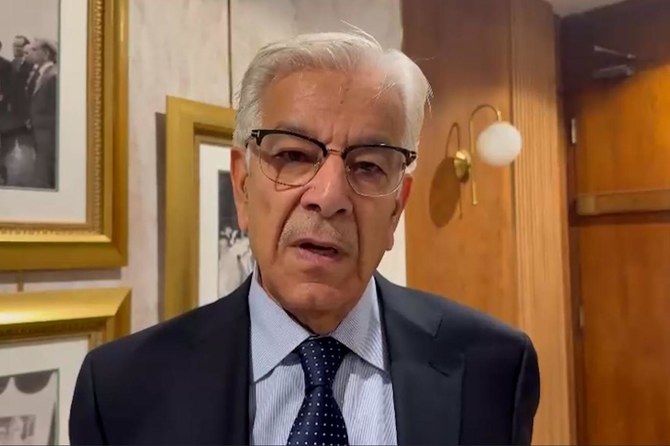
- Chairman of Khan’s party this week said cricketer-turned-politician was being kept in jail so he would agree to a “deal” with the government
- Khan, who has been in jail since August last year after multiple convictions, has vowed not to agree to a “deal” with his political adversaries
ISLAMABAD: Pakistan’s Defense Minister Khawaja Muhammad Asif on Thursday rejected claims that former prime minister Imran Khan was being pressurized to accept a “deal” and come to the negotiating table with the government.
Khan, who was prime minister from 2018-2022, remains jailed in multiple cases, including a 14-year jail sentence for him and his wife for the illegal sale of state gifts. Khan fell out with Pakistan’s powerful military after he was ousted from office via a parliamentary vote in Apr. 2022.
Asif was responding to PTI Chairman Barrister Gohar Khan’s interaction with reporters on Tuesday when he said that the way the former prime minister and his wife were being kept in jail, “these are all [forms of] pressure that Khan somehow agrees to a deal.”
Speaking exclusively to Independent Urdu, Asif rejected claims Khan was being pressurized to come to the negotiating table.
“There is no such thing,” Asif said, claiming that PTI leaders were issuing such statements to stay relevant. “That is why these statements are being issued. There is no truth to them.”
Asif said senior members of the PTI had given statements recently rejecting the possibility of a deal with the government.
“Now if their leadership is issuing contradictory statements themselves, then what comment do we give on it,” he said. “I think their contradictory statements are validating our point.”
Khan’s multiple convictions mean he is banned from holding public office and ruled the 71-year-old out of general elections earlier this year. Arguably Pakistan’s most popular politician, Khan says all cases against him are motivated to keep him out of politics.
Elephant Madhubala to be shifted to Karachi’s Safari Park in May— state media
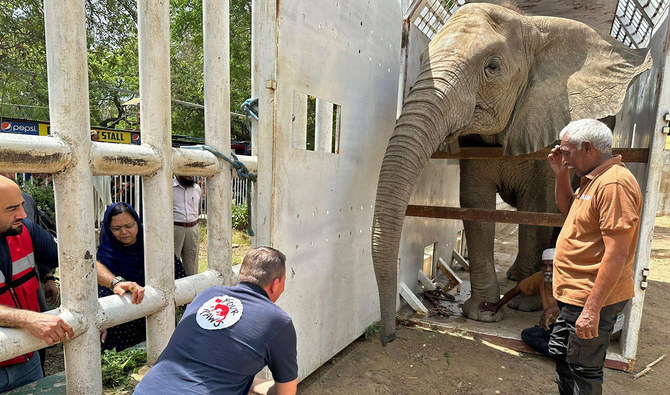
- Madhubala has been in solitary confinement since April 2023 when her companion, elephant Noor Jehan, died
- International animal rights organization warns solitary confinement has taken a toll on Madhubala’s mental health
ISLAMABAD: Pakistani elephant Madhubala, who has been in solitary confinement at Karachi Zoo since last year, will be shifted to Karachi’s Safari Park in May where she will be in the company of two other elephants, state-run media Associated Press of Pakistan reported on Thursday.
Madhubala, one of only three captive elephants alive in Pakistan, was brought to the South Asian country with three other elephants from Tanzania in 2009. However, has been in solitary confinement at Karachi Zoo since April 2023 after her companion, elephant Noor Jehan passed away from illness.
International animal rights organization FOUR PAWS, which has been involved in efforts to have Madhubala relocated to Karachi Safari Park, said last week the solitary confinement has taken a strong toll on her mental condition, with boredom being her biggest stressor.
Animal rights activists have long campaigned against the plight of animals in Pakistan, especially elephants, and demanded they be shifted to “species-appropriate” locations such as the Safari Park.
“According to Zoo administration, the arrangements for the transfer have been completed,” APP said. “Madhubala will join two other elephants, Sonia and Malika after relocation to Safari Park.”
A FOUR PAWS spokesperson said the organization was thrilled to see Madhubala finally getting the treatment she deserves.
“Her story is a testament to the power of collaboration and the importance of animal welfare,” the spokesperson was quoted as saying by APP.
FOUR PAWS says the elephant enclosures at Safari Park would have water elements for bathing, skincare and thermoregulation. Enrichments such as hay nets, varying substrates like soil, sand, clay, and sawdust will be provided for Madhubala to dust bathe while the area is secured by elephant-proof fencing.
Madhubala will be carried from the Karachi Zoo to the Safari Park in a huge transport crate. The elephant is currently being trained to enter and exit the crate by herself and sit inside it.
‘Politically motivated’: Pakistan rejects US State Department report on rights abuses
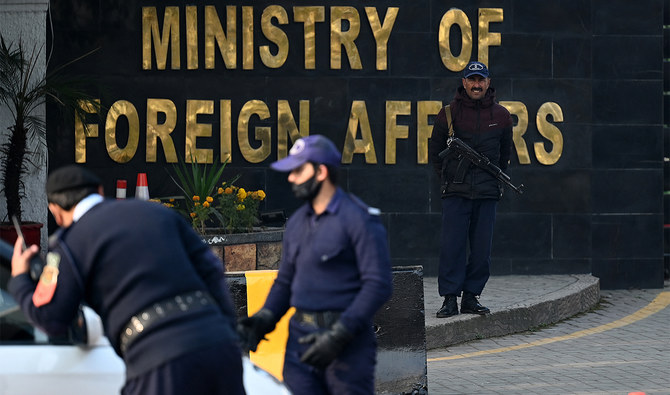
- Annual assessment identified arbitrary detentions, extrajudicial killings, enforced disappearances
- Pakistan government and state agencies deny involvement in missing persons cases, other rights abuses
ISLAMABAD: Pakistan said on Thursday it “categorically” rejected the 2023 country report on human rights practices issued by the US State Department, saying the report was politically motivated, lacking in objective evidence and followed an agenda of “politicization of international human rights.”
The annual human rights assessment released earlier this week identified arbitrary killings, extrajudicial killings, enforced disappearance, torture and “cases of cruel, inhuman, or degrading treatment or punishment by the government or its agents” in Pakistan last year.
The report also said the government “rarely took credible steps” to identify and punish officials who may have committed rights abuses.
“The contents of the report are unfair, based on inaccurate information and are completely divorced from the ground reality,” the Pakistani foreign office said in a statement, adding that the assessment used a “domestic social lens to judge human rights in other countries in a politically biased manner.”
“This year’s report is once again conspicuous by its lack of objectivity and politicization of the international human rights agenda. It clearly demonstrates double standards thus undermining the international human rights discourse.”
The foreign office said it was “deeply concerning” that a report purported to highlight human rights issues around the world was ignoring or downplaying the “most urgent hotspots of gross human rights violations” like Gaza and Kashmir. It also called on the US demonstrate the “requisite moral courage” to speak the truth about all situations and play a constructive role in supporting international efforts to end human rights violations.
“In line with its constitutional framework and democratic ethos, Pakistan remains steadfast in its commitment to strengthen its own human rights framework, constructively engage to promote international human rights agenda, and uphold fairness and objectivity in the international human rights discourse,” the FO added.
Political leaders, rights groups and families of victims have long accused the government, the army and intelligence agencies of being behind cases of arbitrary detentions, extrajudicial killings and enforced disappearances, among other rights abuses. Families say people picked up by security forces on the pretext of fighting militancy or crime often disappear for years, and are sometimes found dead, with no official explanation. Pakistani state agencies deny involvement in such cases.
On Tuesday, Pakistan’s law minister said the government would reconstitute a committee to address enforced disappearances, hours after the release of the US report.
“Now the work is being initiated on this again on the directives of the prime minister. A committee is going to be reconstituted, there will be parliamentary presence in that committee,” Law Minister Azam Nazeer Tarar said.
“There is no lack of seriousness on the government’s part to resolve this issue.”










